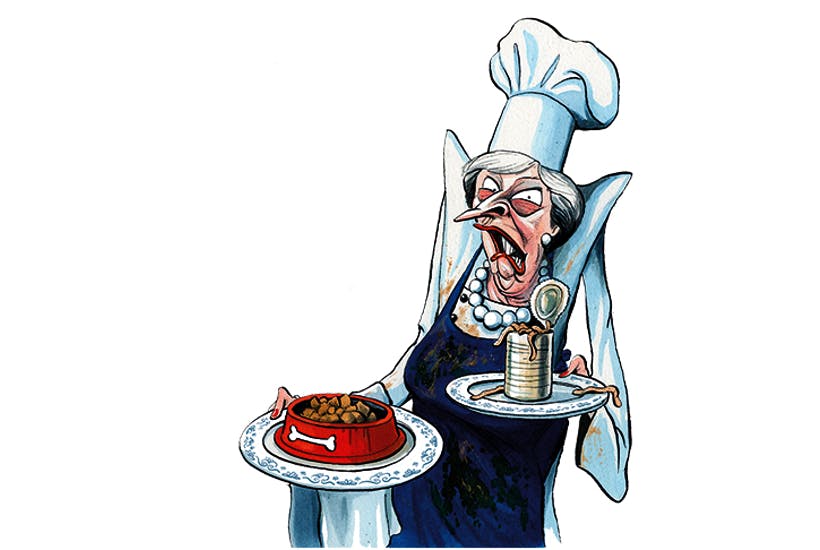When will politicians learn they can’t just buy off voters? You think they would have twigged this during the EU referendum campaign when the Remain camp’s Project Fear utterly failed to sway the electorate’s feelings about the EU. Every household will be £4,300 worse off, the Treasury claimed, which a) wasn’t true and b) looked to many voters like a cynical bung designed to wean them off their Euroscepticism. Such chattering-class cluelessness was on full display in the aftermath of the referendum too. How could people in regions that have received oodles of EU cash — parts of Wales, the old industrial north of England — turn against the EU, Remainers in London wondered?
And now here comes Theresa May with what looks like another bung. A billion-pound bung this time. The Government has launched a Stronger Towns Fund through which £1.6bn will be distributed to less well-off towns in England after Brexit. More than half the money, over a period of seven years, will go to the Midlands and the north of England. Which, funnily enough, are the regions where the Brexit spirit is strongest — the West Midlands returned the highest Leave result of the entire nation, with the North East a close third (after the East Midlands). Is May dangling this post-Brexit cash in order to entice MPs in these parts of the countries to back her deal? It looks like it. And if that’s the case, it stinks.
Labour is right to say that the Stronger Towns Funds has the whiff of a bribe. John McDonnell says the fund ‘smacks of desperation from a government reduced to bribing MPs to vote for their damaging flagship Brexit legislation’. Sure, James Brokenshire, the housing and communities secretary, has insisted that the money will be available for deprived parts of England regardless of whether MPs back May in a week’s time. But the timing of the fund’s launch — a few days before the crunch vote on May’s deal — and the target of its largesse — mostly Brexity parts of the country — does look suspect. If the Government was serious about turning around the fortunes of less well-off towns, wouldn’t it reverse some of its cuts to local authority budgets? And invest in regional industry and job creation? Why the need for a big, showy announcement of a specifically post-Brexit handout?
The introduction, yet again, of narrowly economic questions into the debate about Brexit shows that the political class still don’t get it. They still don’t get why people voted for Brexit. And this goes for politicos from across the political spectrum. The Corbynista left patronises the hell out of Brexit voters by saying that the real reason they voted Leave is because they are ‘hurting’ economically, they feel ‘left behind’, they are still sad and wounded by the fallout from the financial crisis of 2008 onwards. In short, the vote for Brexit was a confused and tragic cry for help, mostly for economic help, and it falls to the PhD-laden activists of the Corbyn set to decipher that cry and answer it. Supercilious much?
On the right too, and in pro-Remain circles, there is an obsession with the economic dimension of Brexit. What will it do to jobs? The amount of time lorries have to wait at Dover? Will we have to pay €7 to visit Europe post-Brexit? What about data-roaming charges when we’re holidaying in Spain? Have you thought about all of this, you dumb Brexiteers?! That is the tone of much of the discussion. It suggests the dimwittery is not among the public but in the political set. It is they who cannot see. It is they who cannot see that the vote for Brexit wasn’t about narrow self-interest or economic aggrandisement — it was based on principle, on belief, on a commitment to weakening the stranglehold of foreign technocrats over British law-making and ensuring that issues of law and trade and border control are overseen domestically, democratically and with our input.
That politicians fail to see this, or refuse to believe it, suggests they have little faith in ordinary people’s ability to think about big ideas. When I said to an MP recently that people are quite concerned about sovereignty, she burst out laughing. Well, how could the little people understand such a grand and historic matter as sovereignty? That’s the great irony here. All these bungs, all this economic Project Fear, all these efforts almost to blackmail voters by saying, ‘Listen, you’ll be a few hundred quid better off if you just let us pursue a Soft Brexit’, only confirm the voting public’s belief that the political class doesn’t take them seriously. The vote for Brexit was a demand to be taken seriously as citizens of a democracy and yet still our rulers treat us as economic units concerned only with our pay packets. Prime Minister, if you want to make stronger towns, then listen to the people of those towns. Give them the Brexit they voted for. A real Brexit, not your naff Remain By Another Name. Nothing would boost less well-off towns more than the treatment of the people who live in them as good, sensible, equal participants in a genuine democracy.







Comments